 
Metaldoctor
Member
Username: Metaldoctor
Post Number: 74
Registered: 01-2007
| | Posted on Friday, February 09, 2007 - 10:02 pm: |    |
http://www.ourstoryof.com/germ an/index.html
"In Detroit , most German immigrants settled in an area known as Germantown, located between the Jefferson and Gratiot Avenue corridors. Many opened shops and businesses ranging from breweries to tailoring shops to tanneries. Harmonie Park was as important center of Germantown . Greek immigrants moved into a part of Germantown that later became known as Greektown."
Does anybody have any pictures from that time? If yes can you please post them. |
 
Mikeg
Member
Username: Mikeg
Post Number: 556
Registered: 12-2005
| | Posted on Saturday, February 10, 2007 - 1:04 am: |    |
Harmonie Hall, circa 1903
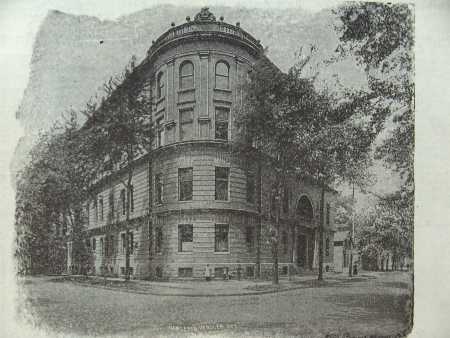
|
 
Mikeg
Member
Username: Mikeg
Post Number: 557
Registered: 12-2005
| | Posted on Saturday, February 10, 2007 - 1:16 am: |    |
Arbeiter Halle (Worker's Hall), photo circa 1903.
It was located on the northwest corner of Catherine and Russell Streets, just north of what is now Lafayette Plaisance (1884 map). Included is an advertisement from an issue of the "Michigan Volksblatt" for the Lyra Choral Society Program to be held in the Arbeiter Halle on Monday, March 20th, 1871.
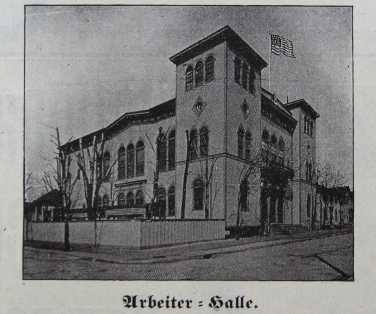
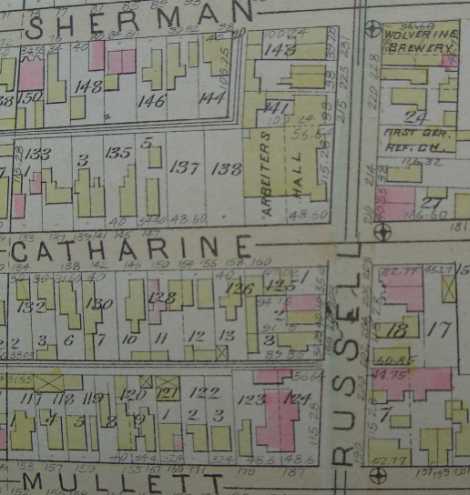
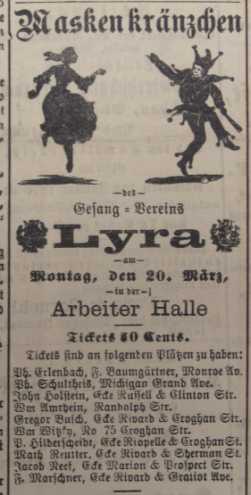
|
 
Jams
Member
Username: Jams
Post Number: 4743
Registered: 10-2003
| | Posted on Saturday, February 10, 2007 - 1:22 am: |    |
http://saint-joseph-detroit.or g/HistoryCorner.html |
 
Mikeg
Member
Username: Mikeg
Post Number: 558
Registered: 12-2005
| | Posted on Saturday, February 10, 2007 - 1:31 am: |    |
Anton Pulte (c. 1903 photo) was a prosperous grocer whose building was located on St. Aubin, between Gratiot Ave. and German St. (1884 map). His descendants are also very prosperous, however they are now in the home building business.
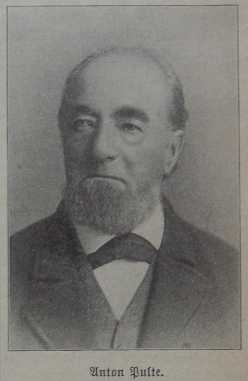
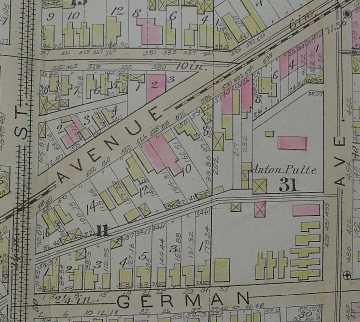
|
 
Charlottepaul
Member
Username: Charlottepaul
Post Number: 463
Registered: 10-2006
| | Posted on Saturday, February 10, 2007 - 12:52 pm: |    |
What type of trees were those in front of the Harmonie Club? I don't remember seeing anything like that in urban planning/design for the CBD of Detroit! |
 
Lowell
Board Administrator
Username: Lowell
Post Number: 3655
Registered: 10-2003
| | Posted on Saturday, February 10, 2007 - 3:02 pm: |    |
Excellent contributions MikeG. This ties in nicely with with the information shared on the German Immigrant tycoon Edward Voight in Ootpik's Old Photos IV. |
 
Mikeg
Member
Username: Mikeg
Post Number: 560
Registered: 12-2005
| | Posted on Saturday, February 10, 2007 - 3:52 pm: |    |
The Gies Restaurant and Cafe on Monroe near Brush was the turn-of-the-century place to get "Good German Cuisine". Billed as the "Headquarters of the Lower City", they served both ladies and gentlemen in their Restaurant and also featured a Main Bar and Cafe. Both imported Wuerzburger and Pilsner beers were available on draft.
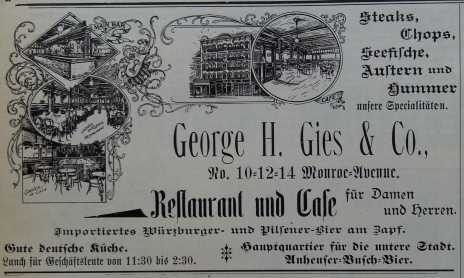
|
 
Missnmich
Member
Username: Missnmich
Post Number: 559
Registered: 11-2004
| | Posted on Saturday, February 10, 2007 - 4:06 pm: |    |
Thanks for the link to St. Joseph's, it was very interesting. Has there been a thread on Germans in Detroit before? I know there was a thread on the Lutheran Cemetery, but I would be interested in hearing about the German Reformed (now United Church of Christ) or the non-Missouri Lutheran communities. |
 
Barnesfoto
Member
Username: Barnesfoto
Post Number: 3017
Registered: 10-2003
| | Posted on Saturday, February 10, 2007 - 5:38 pm: |    |
great stuff...gee, the anti-immigration crowd is always telling us how previous immigrant groups dumped their old languages to learn English...what's with all those words in German? |
 
Irish_mafia
Member
Username: Irish_mafia
Post Number: 726
Registered: 10-2003
| | Posted on Saturday, February 10, 2007 - 5:52 pm: |    |
Barnesfoto,
They did.
That crowd from Germantown were my relatives, including Peter Diederichs, the architect of Old St. Marys.
Some of my relatives speak German as a second or third language today. All speak English as their first language which has contributed greatly to their success in this great melting pot called America.
New immigrants, the legal ones that we welcome, would serve themselves well to learn the language sooner than later. |
 
Jams
Member
Username: Jams
Post Number: 4747
Registered: 10-2003
| | Posted on Saturday, February 10, 2007 - 5:56 pm: |    |
Since you mentioned it, I found this little paragraph in my research:
quote:Impoverished, unskilled, and functionally illiterate, most of these so-called New Immigrants arrived after the closing of the frontier in 1890, that is, after the free land available under the Homestead Act had already been settled. Too poor to buy land, they congregated in America's cities, creating ethnic ghettos the existence of which gave established Americans the impression that these last newcomers were truly unassimilable and should be barred from entry into the country. Subjected to bigotry, discrimination, and economic exploitation, it has been estimated that a full third of the New Immigrants eventually returned to their homeland.
Where are the descendants?
quote:Dispersed far and wide throughout the United States, Bukovina Germans and their descendants can today be found in Arizona, Colorado, Connecticut, Florida, Indiana, Kansas, Maryland, Michigan, New Jersey, Ohio, Pennsylvariia, Washington, D.C., West Virginia, and as far west as California and Washington. Some of their offspring have moved into managerial positions with large corporations or are pursuing professional careers.
http://feefhs.org/bukovina/saw 12-1.html |
 
Irish_mafia
Member
Username: Irish_mafia
Post Number: 728
Registered: 10-2003
| | Posted on Saturday, February 10, 2007 - 6:08 pm: |    |
Good stuff Jams...many descendants remain in the D.
The only reason many of these German and Irish immigrants...thought to be the dregs of the earth, have advanced to said managerial positions is the absolutely rigid disciplinary instruction of the Catholic school system....I believe PBS did a special on the effect on the Irish in NY...ignorance to leadership in a decade.
Unfortunately, that fine organization that I and many of my brethren contribute to have abandoned Detroit to the Baptists.
No more parishes, no more schools, and a bunch of the latest kids trying to get an education with a pisspoor school district and no dads.
Lets hope they learn proper English. |
 
Pam
Member
Username: Pam
Post Number: 1034
Registered: 11-2005
| | Posted on Saturday, February 10, 2007 - 7:19 pm: |    |
quote:No more parishes
Wrong. Check here for active parishes in the city.
http://www.aodonline.org/AODOn line/Parishes+2317/ParishLocat or.htm?ParishLocatorPageType=S earchOptions |
 
Mikeg
Member
Username: Mikeg
Post Number: 561
Registered: 12-2005
| | Posted on Saturday, February 10, 2007 - 7:41 pm: |    |
quote:...what's with all those words in German?
The first group of German emigrants arrived in Detroit in 1830. They began arriving here in large numbers around 1849 and continued coming for the next 40 years or so. Even though they and their children would soon learn and use the English language, the German-language "Detroiter Abendpost" and "Michigan Volksblatt" served the newest of the arriving emigrants over that period of time and also allowed the older members of the German-American community to maintain elements of their culture through the use of their native language.
The anti-German sentiments that accompanied America's entry into the Great War brought a self-imposed end to the high visibility of the German-American communities and their successful members. Therefore, as as noted on the earlier thread, it is no surprise that while Edward W. Voigt was a successful brewer and also
Henry Ford's boss, created the Grand River interurban rail line, started Detroit Edison, laid out Boston-Edison district, built the Grosse Isle Bridge, and was an original founder of the DIA,.... probably much less than a thousand (being very generous here) living Detroiters know this. How sad... |
 
Lowell
Board Administrator
Username: Lowell
Post Number: 3659
Registered: 10-2003
| | Posted on Saturday, February 10, 2007 - 10:33 pm: |    |
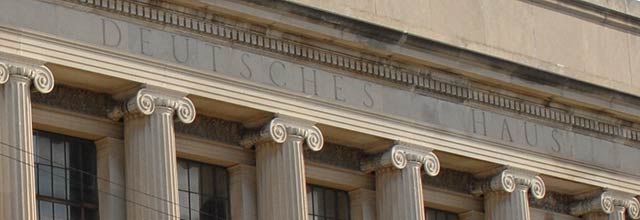
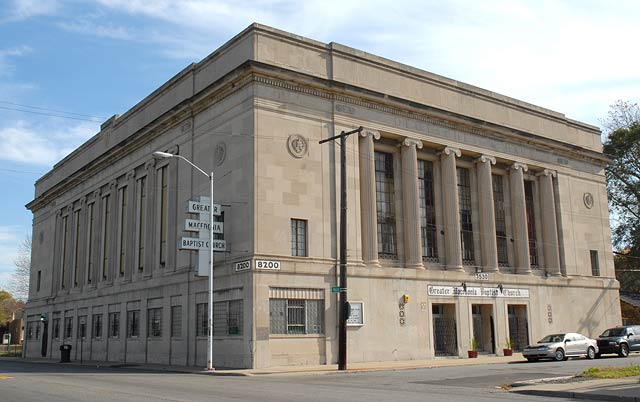
"Ein Feste Burg" on Mack Avenue - The Mighty Deutsches Haus -- grandest by far of the old Detroit ethnic halls.
The reason a lot of Germans came in 1849 was due to the democratic revolutions of 1848 that swept across Europe and Germany. In the case of Germany, the pro-democracy revolutionaries lost and, some argue, the path to Hitler began.
These 'Forty-eighters" Germans left in droves. Consequently they were very socially progressive, democratic and anti-slavery as well as educated and skilled. They flourished in the new world.
They became a decisive element of the Civil War, saving Missouri for the Union and sending over 200,000 men into the Union ranks. Their influence in Wisconsin politics, where I lived, was immense leading to the first workman's compensation laws and other social reforms.
I remember a former Detroit German counsel general, Klaus Schrameyer, who loved to explore the underground art world of Detroit, once saying, "1848, ach, when the good Germans left".
The remarkable Carl Schurz who hailed from nearby Watertown, WI is an archetype. http://en.wikipedia.org/wiki/Carl_Schurz ... Revolutionary, Exile who stole back into Germany to spring his friend from Spandau Prison, Immigrant,Intellectual, Civil War Major General, Cabinet Member, Senator, Ambassador, Publisher and Author.
He also had these words of wisdom:
quote:The man who in times of popular excitement boldly and unflinchingly resists hot-tempered clamor for an unnecessary war, and thus exposes himself to the opprobrious imputation of a lack of patriotism or of courage, to the end of saving his country from a great calamity, is, as to "loving and faithfully serving his country," at least as good a patriot as the hero of the most daring feat of arms, and a far better one than those who, with an ostentatious pretense of superior patriotism, cry for war before it is needed, especially if then they let others do the fighting.
– Carl Schurz, April, 1898 |
 
Jams
Member
Username: Jams
Post Number: 4749
Registered: 10-2003
| | Posted on Saturday, February 10, 2007 - 10:44 pm: |    |
This name kept popping up, I wasn't aware of the Detroit connection.
quote:William Edward Boeing (October 1, 1881 - September 28, 1956) was an aviation pioneer who founded The Boeing Company.
He was born in Detroit, Michigan to a wealthy German mining engineer named Wilhelm Böing who had made a fortune developing large low-grade taconite iron ore deposits and who had a sideline as a timber merchant. William Boeing left Yale in 1903 to go into the lumber side of the business. He bought extensive timberlands around Grays Harbor on the Pacific side of the Olympic Peninsula. He also bought into lumber operations.
http://en.wikipedia.org/wiki/W illiam_Boeing |
 
Livernoisyard
Member
Username: Livernoisyard
Post Number: 2490
Registered: 10-2004
| | Posted on Sunday, February 11, 2007 - 1:12 am: |    |
Hamtramck was German-French. He surely arrived way before 1830. |
 
Metaldoctor
Member
Username: Metaldoctor
Post Number: 82
Registered: 01-2007
| | Posted on Thursday, February 15, 2007 - 1:09 pm: |    |
Bring back germantown...
there is more to Detroit than the auto industry the bridge is still there.
http://www.worldbridge.wayne.e du/germanbridge/econdevelopmen t.html |
 
Missnmich
Member
Username: Missnmich
Post Number: 561
Registered: 11-2004
| | Posted on Thursday, February 15, 2007 - 2:30 pm: |    |
"Ein Feste Burg"
The title and opening words from Martin Luther's great hymn, "A Mighty Fortress." Based on Psalm 46, this hymn is like the national anthem of Lutheranism. |
 
Gistok
Member
Username: Gistok
Post Number: 3641
Registered: 08-2004
| | Posted on Thursday, February 15, 2007 - 2:36 pm: |    |
When one talks about Germans migrating to the USA, it is a very very complex issue. The Bukovina Germans described by Jams was one of many ethnic German groups.
Germany proper didn't exist until 1871 when the King of Prussia became Emperor of Germany (and ruled over several other Kings, Grand Dukes, Dukes, Principalities, and free cities).
The German states (prior to 1871) were a loose confederation of powerful (such as Prussia, Saxony and Bavaria) states, as well as many smaller ones. They were consolidated as part of the Holy Roman Empire from the time of Charlemagne, until 1806, when Napoleon dissolved it.
Germany proper was densely populated in the 18th century. So, many Germans moved to other open lands newly freed of Turks (by the Austrians (Maria Theresia) in the Danube region), or to eastern Europe (in East Prussia, Bukovina and the Volga region of Russia under Catherine the Great, a former German princess). And there were many Germans living in what is today Poland (Silesian Germans), Czech Republic (Sudeten Germans), and northern Italy (South Tirol). And then there were the Austrians and Swiss, also of German heritage.
When the upheavals of the 1848 Revolution in Europe occurred, many intellectual Germans left Europe for the USA.
And when later wars and upheavals (WWI & WWII) happened the ethnic Germans living in Eastern Europe left their homelands for Germany proper, and also for the USA, Canada, Australia, Brazil, Argentina, Paraguay and Chile.
In the late 19th and early 20th century, these non-Germany Germans that came to the USA and Canada were looked down upon by the Reichs Deutsch (Germans that came here directly from Germany). They were considered sort of "half breeds". One reason was that when many of these ethnic Germans left their homeland for eastern Europe in the 18th and 19th century, many picked up foreign words and sayings. Their dialects changed from decades/centuries of isolation from Germany proper. And they were not accepted by the real German community.
That is why many different German Clubs and social organizations sprang up for the Donau Deutsch, the Bukovina Deutsch, the Volga Deutsch, and the Transylvanian Saxons (who emigrated from Germany to the Carpathian Mountains in the 1180's), as well as other non-Germany Germans.
So around 1900, Detroit has a hodgepodge assortment of different peoples all living in the the lower east side.
One of these groups that still exists is called Carpathia Club (founded in 1913 near Van Dyke/Gratiot), and is now located in Sterling Heights.
The snubbing by Reichs Deutsch of the non-Germany Germans generated a dislike among German clubs (of each other) that continues to this day. Only in the last 20 years among the 2nd and 3rd generation of ethnic Germans in the Detroit area has this dislike finally subsided.
As an ethnic German (born in Germany) of a German born mother and a Danube German father, I have seen some of this silliness.
I now have friends from many of the different German clubs, and we all think that the bigotry and silliness among Germans of the past has finally been put to rest... although in Germany today you may still find some conservative Upper Bavarians that still thumb their noses at the Prussians! 
(Message edited by Gistok on February 15, 2007) |
 
Jams
Member
Username: Jams
Post Number: 4774
Registered: 10-2003
| | Posted on Thursday, February 15, 2007 - 7:50 pm: |    |
Gistok,
Thank you.
The definiton of a German is extremely complex as there was no "Germany" prior to 1871 as you posted.
Technically, the French might be considered as Germans as the forebearers were Franks, a Germanic tribe. And, of course, there would not be an England if a certain Pope had not applied the name "Angles" to the slaves he saw in a market one day, as he thought they resembled "Angels". The Anglo-Saxons and Jutes from the Germanic Region overran the Picts (a Celtic Tribe of the area of current England) pushing them to the north to current Scotland.
Then the Danes (Vikings) and the Normans added their blood lines to the mix as well. |
 
Irish_mafia
Member
Username: Irish_mafia
Post Number: 731
Registered: 10-2003
| | Posted on Thursday, February 15, 2007 - 9:24 pm: |    |
All true!
We had the high German that married the low German...bad news.
We had the relatives from Alsace-Lorraine who because they were Germanic, aroused some sympathy from the French family that my Kraut based uncle moved into, because that area can't decide if it is French or German...good news. |
 
Jhartmich
Member
Username: Jhartmich
Post Number: 16
Registered: 04-2006
| | Posted on Thursday, February 15, 2007 - 9:45 pm: |    |
Excellent Information.
From the Catholic perspective:
St. Mary’s in Greektown was the original church for the German people. As the population grew, my church, St. Joseph’s, was built to alleviate the overcrowding of St. Mary’s.
http://saint-joseph-detroit.or g/GermansInDetroit.html
History of the Church: http://saint-joseph-detroit.or g/FullHistory.html
“The altars, statues, confessionals, and pulpit are all of wood, without cast ornament. Many of the decorations were imported from Germany: the high altar, almost all the statues, and the stations of the cross. Other decorative items were made in Detroit, partly by a craftsman named Anthony Osebald, who belonged to St. Joseph. Other furnishings, such as the St. Joseph Altar, were made by the Belgian-American inventor Charles Van den Poele, who later became "the father of the streetcar." |
 
Kathinozarks
Member
Username: Kathinozarks
Post Number: 190
Registered: 11-2006
| | Posted on Thursday, February 15, 2007 - 10:19 pm: |    |
mikeg, thanks for mentioning the Abendpost.
I had forgotten that memory of my grandparents reading it at the kitchen table and trying to get us to understand some of the words!
What a great memory! |
 
Lowell
Board Administrator
Username: Lowell
Post Number: 3677
Registered: 10-2003
| | Posted on Thursday, February 15, 2007 - 11:33 pm: |    |
Great post Gistok and others. What is a German reminds be bit of what is a Detroiter - the Reich Detroiters who live in the city of Detroit? What about the Livonians, Uticans, the Mount Clemenese and the Melvindalians?
For many German speakers, any German-ness ends with a shared language like the US and New Zealand. Alsatians [Elsass] where I have spent some time speak German as their first language but do not think of themselves as German, nor as French under whose government they now are.
They are simply Alsatian and, after having had their beautiful land ravaged by wars over who they are supposed to be, don't care much about nati0nalism. It is fitting that the European Union would choose Stasbourg, the de facto capitol of Elsass, to be the seat of its Council of Europe. |
 
Korridorkid
Member
Username: Korridorkid
Post Number: 28
Registered: 01-2005
| | Posted on Friday, February 16, 2007 - 12:44 am: |    |
Lowell-
Is "Elsass" the German based spelling of that region?
I've always read it as "Alsace". Is that just Frenchie-talk?
(Not correcting you, just curious about the regionalism)
P.S.-Robin Sommers says "Hi" |
 
Mikeg
Member
Username: Mikeg
Post Number: 583
Registered: 12-2005
| | Posted on Friday, February 16, 2007 - 6:43 am: |    |
Alsace in German: Elsass [source]
(Can also be written as Elsaß using the old "scharfes S"). |
 
Gistok
Member
Username: Gistok
Post Number: 3650
Registered: 08-2004
| | Posted on Friday, February 16, 2007 - 12:59 pm: |    |
And then there's Lothringen (Lorraine).
Lowell you hit upon an interesting point... about Strasbourg being the HQ of the EU Parliament. And as we know Brussels is the HQ of the EU bureaucracy. Both are where the borders of Germanic Europe and Romance Europe meet.
And both are in what was once Lotharingia, the central Kingdom (the other 2 being Germany and France) of Charlemagne's empire, which was split (842AD) into 3 parts, for his 3 grandsons, Louis (Germany), Lothar (Lotharingia), and Charles (France).
It was this middle "kingdom" that has been fought over by the other 2 "kingdoms" for the last thousand years.
During much of the middle ages this middle kingdom was broken apart into such fought over provinces as Holland, Flanders, Wallonia, Alsace, Lorraine, Burgundy, Savoy and several of the Swiss Cantons. |
 
Metaldoctor
Member
Username: Metaldoctor
Post Number: 92
Registered: 01-2007
| | Posted on Friday, February 16, 2007 - 6:36 pm: |    |
I just love these blogs. thank you very much. Are there any germans from my home town Celle here?
Maybe Detroit can adopt some partner cities and get a healthy exchange of ideas and concepts.
http://www.landgestuetcelle.de /cms/front_content.php
http://www.region-celle.com/
need german television try
http://overseatv.com/ |
 
Irish_mafia
Member
Username: Irish_mafia
Post Number: 735
Registered: 10-2003
| | Posted on Friday, February 16, 2007 - 6:50 pm: |    |
Alsace in German: Elsass [source]
(Can also be written as Elsaß using the old "scharfes S").
______________________________ __________________
Damn! I've been speaking French around the house again when i thought I was speaking German. |
 
Raggedclaws
Member
Username: Raggedclaws
Post Number: 23
Registered: 08-2006
| | Posted on Friday, February 16, 2007 - 7:15 pm: |    |
My maternal sides of family were all "Germans from Russia", farming Ukraine at Catherine the Great's request. They all arrived prior to 1900 and by 1910 were living at 18th and Poplar, which according to Granny was a very German area. |
 
Kathinozarks
Member
Username: Kathinozarks
Post Number: 193
Registered: 11-2006
| | Posted on Saturday, February 17, 2007 - 8:36 am: |    |
This thread is making me want to try to learn the German language. I've never been able to learn Spanish or any other, so I'm wondering - is it just impossible for some people to learn a second language?
My grandparents were German from Wolfenhausen(Wolfhausen?) and Remmingsheim (sp?) and they gave me some miniscule understanding or desire to understand when I was a kid. Now at 45 I'm thinking it might be too hard. Also, aren't there many different language variations?
My mom says they spoke Schwabish (phonetic spelling) I think.
If anyone cares, let me know |
 
B24liberator
Member
Username: B24liberator
Post Number: 13
Registered: 01-2007
| | Posted on Saturday, February 17, 2007 - 10:20 am: |    |
Kathinozarks: Schwabia, was (I think) a part of the old Kingdom of Wurttemburg, which is modern day southern Germany, near Lake Constance (the Bodensee). Friedrichshafen... Beautiful city, roamed thru there during my Army days. |
 
Metaldoctor
Member
Username: Metaldoctor
Post Number: 93
Registered: 01-2007
| | Posted on Saturday, February 17, 2007 - 11:43 am: |    |
Here’s a treat for all German descendants, Germany was completely rebuilt in mind body and spirit. And, (his architecture), the process started after 1945. We need the same spirit in Detroit, why not invite those Germans to help us in Detroit today. It would be a beautiful place once again. I know this for a fact, because of
my internship program I have tested in 2005, and 2006.
http://images.google.com/imgre s?imgurl=http://www.galenfrysi nger.com/europe/dresden05.jpg& imgrefurl=http://www.galenfrys inger.com/dresden.htm&h=347&w= 648&sz=71&hl=en&start=15&tbnid =EqF4hYQp4lcPWM:&tbnh=73&tbnw= 137&prev=/images%3Fq%3Ddresden %26svnum%3D10%26hl% |
 
Danny
Member
Username: Danny
Post Number: 5522
Registered: 02-2004
| | Posted on Saturday, February 17, 2007 - 12:33 pm: |    |
The Detroit German community was super large all over the city from the Detroit River to 8 Mile Rd. It lasted until the suburban sprawl came in and Black-folks took over the city in the after 1974. The Detroit Germans both Christian and Jewish reshape the its buildings, housing and businesses. Much of the ghettohoods of Detroit were built by Germans. There were German architects who post their names in their buildings on top with the years from 1870s to after 1931. Those were the days. From Germantown at Harmonie Park to the ghettohoods of Detroit to the suburbs. |
 
Missnmich
Member
Username: Missnmich
Post Number: 562
Registered: 11-2004
| | Posted on Saturday, February 17, 2007 - 1:21 pm: |    |
Metaldoctor --
My paternal great grandfather, a skilled cabinet maker, was born in Celle in 1859.
Perhaps we're distant cousins?
(Message edited by missnmich on February 17, 2007) |
 
Gistok
Member
Username: Gistok
Post Number: 3651
Registered: 08-2004
| | Posted on Saturday, February 17, 2007 - 3:52 pm: |    |
When I was visiting Germany in 1973, I went with a group of ethnic German students. We visited Kaiserslautern (called K-Town by US servicemen) near the French & Belgian border.
There is a genealogical institute there that archives the family names and history of milions of German families.
They had researched the surnames of all the students in our group. I found out that my fathers family (last name ISTOK) had originated from the Rheinland region (Pfalz), and that the original name was "OST" or "OSTEN". They migrated from the Rheinland to to lower Danube via flatboats (called Ulmner Schachtel) circa 1715 to what was then Austria-Hungary (today where Rumania, Yugoslavia and Hungary come together). The Turks had been driven out decades before.
Their family name was "Magyariziert" (Hungarianized) to "ISTOK" at some time in the 19th century, even though the family lived in an all German town called Neuburg (Newcastle), although "Uivar" was Rumanian name.
When World War II was raging, Hitler's henchmen conscripted all available ethnic Germans into Army or SS. My father was conscripted at 17, and never saw his hometown again.
By 1944 all the ethnic Germans in eastern Europe were starting to see that Germany was going to lose the war, and all feared the advancing Soviet troops. Those that could fled to Germany, those that stayed behind were either sent off to Siberia to one of Stalin's work camps for a few years, or in the case of those unfortunate enough to have lived in the Yugoslavian side of the border, ended up in one of Tito's death camps (where many were starved to death).
From 1944-48 over 15 million ethnic Germans living in eastern Europe relocated to Germany proper, or overseas. 1948 was the year that Stalin allowed the return of those that were sent off to Siberia, to migrate to Germany. So today Eastern Europe is pretty much devoid of ethnic Germans.
My father was reunited with his family in Germany in 1945, and we came to the USA in 1958. |
 
Rbdetsport
Member
Username: Rbdetsport
Post Number: 219
Registered: 11-2005
| | Posted on Saturday, February 17, 2007 - 3:56 pm: |    |
St.Antoine used to be a railroad line? Right through downtown? |
 
Mikeg
Member
Username: Mikeg
Post Number: 589
Registered: 12-2005
| | Posted on Saturday, February 17, 2007 - 6:54 pm: |    |
RBdetsport, if your question is regarding the railroad line shown on the 1884 map above (with my Anton Pulte posting), it ran down the middle of Dequindre, not St. Antoine. Later, Dequindre south of Mack was abandoned so that the railroad line could be installed below grade in what is known as the "Dequindre Cut". |
 
Kathinozarks
Member
Username: Kathinozarks
Post Number: 199
Registered: 11-2006
| | Posted on Saturday, February 17, 2007 - 6:57 pm: |    |
B24liberator - thanks for that info. I sure do appreciate it! |
 
Michmeister
Member
Username: Michmeister
Post Number: 112
Registered: 10-2006
| | Posted on Saturday, February 17, 2007 - 8:01 pm: |    |
Kathinozarks- it is never too late to learn anything. While mastering the language would be challenging, especially if you have no chance to practice with anyone at any length of time. Do one thing, however, buy a german/english dictionary and read it. You will be amazed at how many words are the same or at least very similar, differing naturally with the pronunciation. Spoken straightforwardly, the grammar is also similar although Germans like to play with their sentence structure, also "spicing" up the language with words that could be left out of a sentence without changing the meaning. I pretty much taught myself but I was young and it was a force-feeding as I had to work and live here (there was no way I was going to do it half-assed and get by on "Denglisch"). |
 
Mikeg
Member
Username: Mikeg
Post Number: 591
Registered: 12-2005
| | Posted on Saturday, February 17, 2007 - 9:36 pm: |    |
Kathinozarks,
I agree with Michmeister, the best first step would be to pick up a pocket German-English and English-German dictionary. I bought one published by Langenscheidt prior to taking some "tourist" German classes offered by my local Adult Ed. I also picked up some audio cassette tapes designed to teach you conversational German, which are helpful for pronunciation after you have had some initial classes.
Armed with my tourist German speaking skills (limited vocabulary and poor pronunciation skills), my Langenscheidt and a willingness to speak German first, I have successfully navigated my way through the German countryside - off the beaten path and mostly without a guide - on two separate vacations totaling almost one month's time "in country". By making an effort to speak their language first in a situation, it often "broke the ice" and got me a response in English and more help than I could have ever expected.
I had taken two years of French in high school, but that was thirty years prior to my attempting to learn German. I think it is never too late to try and learn to speak a new language. Of course, learning it well enough to write in it is a whole 'nother challenge. |
 
Metaldoctor
Member
Username: Metaldoctor
Post Number: 95
Registered: 01-2007
| | Posted on Sunday, February 18, 2007 - 11:02 am: |    |
Metaldoctor --
My paternal great grandfather, a skilled cabinet maker, was born in Celle in 1859.
Perhaps we're distant cousins?
;
;
;
;
Hello missnmich
Perhaps, anything is possible I was born in 1959 Celle, Germany and came in to United States in 1984 to find my father an U.S. GI and occupied West Germany.... May I ask what was his name? I know people in my town that are still members of the historical Schutzencorps Neuenhausen Von 1815 e.V. Celle.
cnielbock@sbcglobal.net |
 
Jams
Member
Username: Jams
Post Number: 4797
Registered: 10-2003
| | Posted on Sunday, February 18, 2007 - 11:16 am: |    |
quote:Their family name was "Magyariziert
Curious, Magyar is Hungarian. What would be the translation of iziert? |
 
Metaldoctor
Member
Username: Metaldoctor
Post Number: 96
Registered: 01-2007
| | Posted on Sunday, February 18, 2007 - 12:17 pm: |    |
Hello Jams
Unfortunately I don’t know that name but here is some information that might be helpful to you.
http://64.233.179.104/translat e_c?hl=en&u=http://www.donaumo narchie.com/
http://translate.google.com/tr anslate?sourceid=navclient&hl= en&u=http%3a%2f%2fwww%2edeutsc he%2dschutzgebiete%2ede%2fverb reitung%5fder%5fdeutschen%2eht m |
 
Terryh
Member
Username: Terryh
Post Number: 153
Registered: 11-2006
| | Posted on Sunday, February 18, 2007 - 1:38 pm: |    |
This is a very educational informative thread. There is a restaurant called Jacobys? in that area still in operation. I have a German background and found out my Grandfather emigrated from Oklahoma around 1925 to find work in the growing auto industry. He lived on St. Antoine.
That Gothic style Catholic church off Gratiot is St. Josephs? |
 
Michmeister
Member
Username: Michmeister
Post Number: 115
Registered: 10-2006
| | Posted on Sunday, February 18, 2007 - 2:32 pm: |    |
"iziert" means as much as -ized. |
 
Jams
Member
Username: Jams
Post Number: 4806
Registered: 10-2003
| | Posted on Sunday, February 18, 2007 - 2:42 pm: |    |
So it translated as "Hungarianized".
Thanks. |
 
Kathinozarks
Member
Username: Kathinozarks
Post Number: 202
Registered: 11-2006
| | Posted on Sunday, February 18, 2007 - 6:51 pm: |    |
Thank you Michmeister and Mikeg for your support and really good advice. I will definitely get the dictionary for a start. Danka! (is that right?) 
Terryh - Jacoby's is still open as far as I know. I think my brother went there a few months ago. |
 
Metaldoctor
Member
Username: Metaldoctor
Post Number: 98
Registered: 01-2007
| | Posted on Tuesday, February 20, 2007 - 12:14 pm: |    |
I came across the most shocking account regarding Detroit.
http://www.exulanten.com/detro it.html
What can be done?
We have to highlight the positive and spread it on a national level each to his or her ability!
http://www.pps.org/squares/inf o/squares_articles/us_canada_s quares |
 
Gistok
Member
Username: Gistok
Post Number: 3670
Registered: 08-2004
| | Posted on Tuesday, February 20, 2007 - 12:35 pm: |    |
I just read thru this guys website (he doesn't leave an EMAIL address or give his name).
He's a nutcase who blathers on about everything from Germany having less freedom today than they did during Hitler's time, to rewriting early German history to suit his twisted vision.
Sounds like someone intelligent, yet on the fringes... |
 
Scottr
Member
Username: Scottr
Post Number: 303
Registered: 07-2006
| | Posted on Tuesday, February 20, 2007 - 12:39 pm: |    |
Thank You! for that first site, metaldoctor - while i found the detroit page to be woefully out of date, and unnecessarily exaggerated, I looked at some of the rest of the site, and found a history of Frankenmuth. Most important to me, though, in a list of Frankemuth and Frankentrost settlers, was a painting of my great-great grandfather, Lorenz Loesel, one of the original settlers of Frankenmuth. I wish it was a larger image, but it's good to know something like that exists. |
 
Scottr
Member
Username: Scottr
Post Number: 304
Registered: 07-2006
| | Posted on Tuesday, February 20, 2007 - 12:44 pm: |    |
Gistok: http://www.exulanten.com/email .html
his site design is not the greatest... |
 
Apbest
Member
Username: Apbest
Post Number: 430
Registered: 03-2006
| | Posted on Tuesday, February 20, 2007 - 1:06 pm: |    |
that page is sorta racist....there's tons of pictures of chimps on the detroit site |
 
Kathleen
Member
Username: Kathleen
Post Number: 1971
Registered: 10-2003
| | Posted on Friday, February 23, 2007 - 6:33 am: |    |
My paternal grandfather's maternal grandfather and his brother arrived in Detroit in 1852. The family name was Faber. Grandpa Adam Faber married Katharine Muhlhaus, whose family name today is known as Mellus (as in the Mellus newspapers downriver).
Adam's daughter Anna married an Irish guy Dennis Mahoney but maintained her German heritage and shared it with her only child, my grandfather. I've inherited a few German items from my grandfather's youth, evidence that the German heritage was still evident two generations after their arrival in Detroit.
Here's the cover from the 1904 program for the annual German festival known as the Deutscher Jahr-Markt. It was sponsored by the local German Aid Societies (United Arbeiter Unterstuetzungs Vereine). In Detroit, the oldest of these aid societies was the Arbeiter Aid Society. In 1904, this fair was held October 13-16.
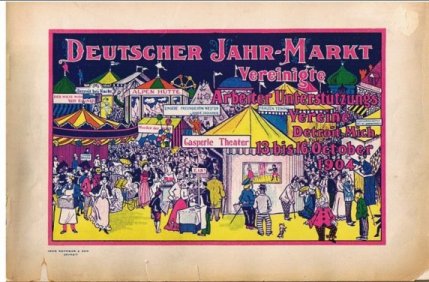
The program is filled with advertising from local businesses, including a number of breweries, and political ads (1904 was an election year!). |
 
Mikeg
Member
Username: Mikeg
Post Number: 616
Registered: 12-2005
| | Posted on Friday, February 23, 2007 - 8:31 am: |    |
Here is a photo of the officers of the "Arbeiter Unterstützungs Vereins" that appeared in the 1903 Golden Jubilee edition of the Michigan Volksblatt.
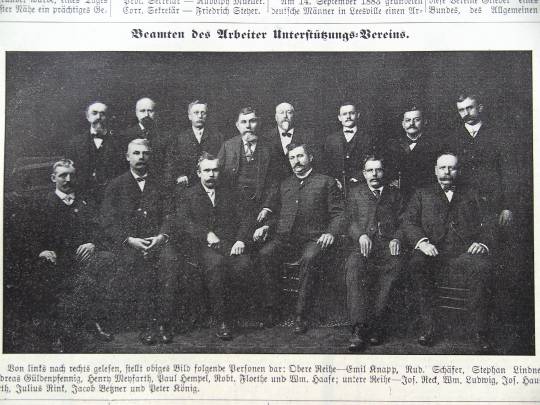
This is my best attempt at reading their names:
Back row (left to right): Emil Knapp, Rud. Schäfer, Stephan Lindne(?), Anrdeas Güldenpfennig, Henry Mensarth, Paul Hempel, Robt. Floethe, Wm. Haase; Front row: Jos. Reck(?), Wm. Ludwig, Jos. Hau(?)th, Julius Rink, Jacob Betzner and Peter König.
At the time, Herr König was the owner of Koenig Coal:
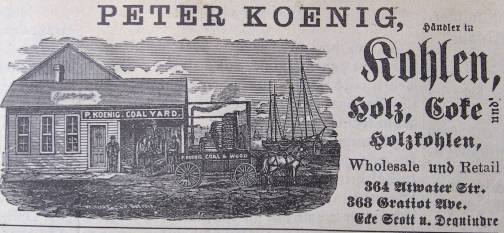
1920 Photo:
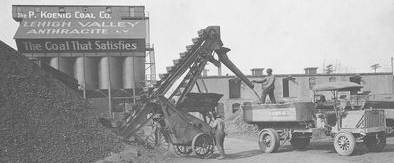
Peter König came to the USA from Germany at age 34 and founded his company in 1870 as a wood yard on Gratiot Avenue near Riopelle. Since then, the company he founded has sold different types of products: wood and coal, heating oil and diesel fuel, sand and gravel, and ready-mix concrete. As times have changed, so did his company and today the only product they supply is ready-mix concrete, doing business as Koenig Fuel & Supply LLC.
On a side note, Our German Story has entered production and is slated to be aired on WXYZ-TV this coming December.
(Message edited by Mikeg on February 23, 2007) |
 
Livernoisyard
Member
Username: Livernoisyard
Post Number: 2632
Registered: 10-2004
| | Posted on Friday, February 23, 2007 - 4:21 pm: |    |
quote:In the 1880’s, German immigrant Oscar Meyer began his career as butcher in Detroit’s Germantown before his moniker became a famous brand name for packaged hot dogs and cold cuts.
How come he's Meyer in Detroit but Mayer in Chicago and Madison?
His Wiki has him as Mayer also. Looks like somebody in Detroit isn't so hot with German names...
quote:Oscar Mayer
From Wikipedia, the free encyclopedia
Oscar Mayer is an American meat and cold cut production company, now owned by Kraft Foods a division of the Altria Group, known for its hot dogs, bologna, bacon and Lunchables products.
Bavarian immigrant Oscar Ferdinand Mayer began working at a meat market in Detroit, Michigan, and later in Chicago, Illinois. In 1883 in Chicago, Oscar Mayer leased the Kolling Meat Market along with his brother, Gottfried Mayer. The two sold bratwurst, liverwurst and weißwurst and were popular in the predominantly German neighborhood of Chicago around the market.
(Message edited by LivernoisYard on February 23, 2007) |
 
Michmeister
Member
Username: Michmeister
Post Number: 120
Registered: 10-2006
| | Posted on Tuesday, February 27, 2007 - 2:41 pm: |    |
The coal chute on the side of our house had the name Koenig imprinted on it. Interesting explanation 24 years after I moved out. |
 
Danny
Member
Username: Danny
Post Number: 5581
Registered: 02-2004
| | Posted on Tuesday, February 27, 2007 - 3:22 pm: |    |
Mikeg,
Today Konig is still in the coal producing business. There are several locations at E.7 Mile Rd. near the Chrysler FWY. and Plymouth Rd. west of Telegraph Rd. in Redford TWP. |
 
Msartlit
Member
Username: Msartlit
Post Number: 2
Registered: 04-2007
| | Posted on Tuesday, April 10, 2007 - 9:48 am: |    |
What about Conrad Pfeiffer and the Pfeiffer brewery? Conrad was a huge supporter of local German theatre. My great grandfather "Fritz Busch" starred in Othello, in a theatre on Macomb. He was also one of the first Letter Carriers in the City of Detroit. His son Henry was Commissioner of Parks around 1934 and lived in the white house on Belle Isle.
I would like any descendents of Heinrich "Henry" Busch or Friedrich "Fritz" Busch to contact me. |
 
Stinger4me
Member
Username: Stinger4me
Post Number: 323
Registered: 08-2007
| | Posted on Saturday, October 11, 2008 - 3:06 pm: |    |
Didn't read the whole post, can someone shed light on the word, "Kashub"? |
 
Eastsidedame
Member
Username: Eastsidedame
Post Number: 581
Registered: 12-2006
| | Posted on Sunday, October 19, 2008 - 9:04 pm: |    |
Stinger4me: My Polish dad (born Hamtramck 1921) would call someone a "Kashub" when they were half German and half-Polish. He had lots of friends like that.
They are a slavic ethnic group of north-central Poland, who may or may not be half-and-half.
http://en.wikipedia.org/wiki/K ashubians |